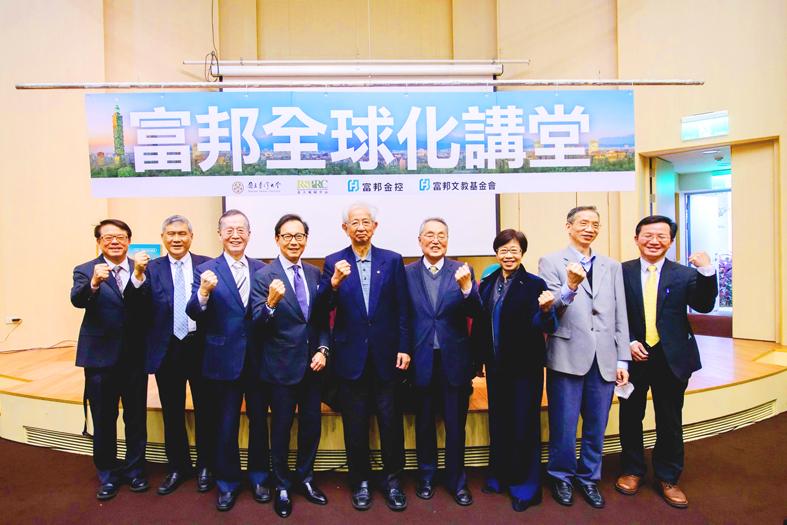Power solutions provider Delta Electronics Inc (台達電) has been charging its business units an internal carbon price of US$300 per tonne this year, as the company aims to incentivize carbon reduction and raise funds for research and development (R&D) of green technology, chairman Yancy Hai (海英俊) told a decarbonization forum in Taipei.
“We all dream of a carbon-
neutral 2050, but it is not enough to boost renewable energy, we also need to curb consumption. At our current level of technology, carbon neutrality at any year is just a dream,” Hai said.

Photo courtesy of Fubon Financial Holding Co
The carbon price of US$300 per tonne is “quite high,” but the scheme is supposed to be “painful” by design, to incentivize carbon savings, he said.
“With the income from the scheme, we can invest in technologies like carbon capture that can be game changers in the future,” he added.
While Taiwan has set an ambitious goal of becoming carbon neutral by 2050, Hai said the rate of change is not fast enough, calling on Taiwanese businesses to go above and beyond to accelerate the rate of decarbonization.
The Taiwan Climate Partnership, which was founded by eight top Taiwanese tech companies — including Delta, Taiwan Semiconductor Manufacturing Co (TSMC, 台積電), Acer Inc (宏碁) and Asustek Computer Inc (華碩) — has the goal of forming a Taiwanese “green supply chain,” Hai said.
Taiwan’s carbon emissions per capita is among the top five in the world, Hai said, adding that he hoped the nation would be able to decouple economic growth from carbon emissions.
To decarbonize Taiwan’s grid, more energy storage would be necessary, and Delta has invested in large containerized storage units, he said.
Speaking at the same forum, Taiwan Institute of Sustainable Energy chairman Eugene Chien (簡又新) said that reaching net-zero must come with curbing power usage, as well as developing green energy.
“No amount of solar panels and wind turbines will help us decarbonize fully without reduction of demand,” Chien said.
“Instead of just talking about supply-side solutions, Taiwan should take a more holistic view and discuss how we can use energy more effectively,” Chien added.

STEEP DECLINE: Yesterday’s drop was the third-steepest in its history, the steepest being Monday’s drop in the wake of the tariff announcement on Wednesday last week Taiwanese stocks continued their heavy sell-off yesterday, as concerns over US tariffs and unwinding of leveraged bets weighed on the market. The benchmark TAIEX plunged 1,068.19 points, or 5.79 percent, to 17,391.76, notching the biggest drop among Asian peers as it hit a 15-month low. The decline came even after the government on late Tuesday authorized the NT$500 billion (US$15.2 billion) National Stabilization Fund (國安基金) to step in to buoy the market amid investors’ worries over tariffs imposed by US President Donald Trump. Yesterday’s decline was the third-steepest in its history, trailing only the declines of 2,065.87 points on Monday and

TAKING STOCK: A Taiwanese cookware firm in Vietnam urged customers to assess inventory or place orders early so shipments can reach the US while tariffs are paused Taiwanese businesses in Vietnam are exploring alternatives after the White House imposed a 46 percent import duty on Vietnamese goods, following US President Donald Trump’s announcement of “reciprocal” tariffs on the US’ trading partners. Lo Shih-liang (羅世良), chairman of Brico Industry Co (裕茂工業), a Taiwanese company that manufactures cast iron cookware and stove components in Vietnam, said that more than 40 percent of his business was tied to the US market, describing the constant US policy shifts as an emotional roller coaster. “I work during the day and stay up all night watching the news. I’ve been following US news until 3am

Six years ago, LVMH’s billionaire CEO Bernard Arnault and US President Donald Trump cut the blue ribbon on a factory in rural Texas that would make designer handbags for Louis Vuitton, one of the world’s best-known luxury brands. However, since the high-profile opening, the factory has faced a host of problems limiting production, 11 former Louis Vuitton employees said. The site has consistently ranked among the worst-performing for Louis Vuitton globally, “significantly” underperforming other facilities, said three former Louis Vuitton workers and a senior industry source, who cited internal rankings shared with staff. The plant’s problems — which have not

TARIFF CONCERNS: The chipmaker cited global uncertainty from US tariffs and a weakening economic outlook, but said its Singapore expansion remains on track Vanguard International Semiconductor Corp (世界先進), a foundry service provider specializing in producing power management and display driver chips, yesterday withdrew its full-year revenue projection of moderate growth for this year, as escalating US tariff tensions raised uncertainty and concern about a potential economic recession. The Hsinchu-based chipmaker in February said revenues this year would grow mildly from last year based on improving supply chain inventory levels and market demand. At the time, it also anticipated gradual quarter revenue growth. However, the US’ sweeping tariff policy has upended the industry’s supply chains and weakened economic prospects for the world economy, it said. “Now